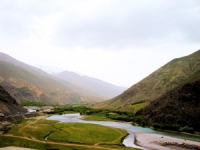Water sharing between Central Asian countries has been conflicting for quite a long time already.
Linking natural capital, rural livelihoods, and conflict: toward governance for environmental security and peace in Tajikistan
Linkages between natural capital and rural livelihoods have not been adequately studied in analyses of conflict in Central Asia. Environmental degradation and depletion in predominantly rural and agricultural regions contribute to increased social conflict, as well as increased potential for violent conflict. In many cases, especially in those with authoritarian governments, lack of environmental governance capacity in the public, civil society, and business sectors is largely responsible for creating and condoning a context in which processes of natural capital loss occur. This research paper, focusing on Tajikistan, concludes that loss of natural capital in Tajikistan has compromised rural livelihood options and contributed to the emergence of unsustainable livelihood strategies, social conflict, especially gender inequity, and - in combination with other factors such as high rural population growth and a significant youth bulge; high unemployment of young men and women; and regionalism - a heightened probability of renewed violent conflict. Efforts to strengthen capacity for environmental governance and promote peace are underway, but require additional support, information, and guidance. In order to be successful, development efforts must help decentralize national decision-making structures and processes; replace regionalism-based appointments and hiring practices with democratic elections and professionalism; disentangle the government and business sectors; empower small and medium sized businesses and the civil society sector; and ensure that structures and processes of environmental governance in Tajikistan are legitimate, accountable, transparent, knowledgeable, efficient, and self-sustaining.





